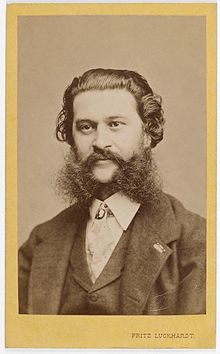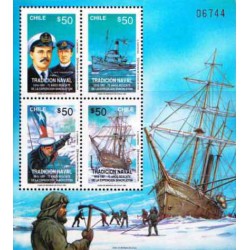- جدید
- ناموجود



توجه : درج کد پستی و شماره تلفن همراه و ثابت جهت ارسال مرسوله الزامیست .
توجه:حداقل ارزش بسته سفارش شده بدون هزینه پستی می بایست 100000 ریال باشد .
توجه : جهت برخورداری از مزایای در نظر گرفته شده برای مشتریان لطفا ثبت نام نمائید.
| Johann Strauss II | |
|---|---|

Johann Strauss II
|
|
| Born | Johann Strauss II October 25, 1825 Vienna, Austrian Empire |
| Died | June 3, 1899 (aged 73) Vienna, Austria-Hungary |
| Occupation | Classical composer |
Johann Strauss II (October 25, 1825 – June 3, 1899), also known as Johann Strauss Jr., the Younger, the Son (German: Sohn), Johann Baptist Strauss, was an Austrian composer of light music, particularly dance music and operettas. He composed over 500 waltzes, polkas, quadrilles, and other types of dance music, as well as several operettas and a ballet. In his lifetime, he was known as "The Waltz King", and was largely then responsible for the popularity of the waltz in Vienna during the 19th century.
Strauss had two younger brothers, Josef and Eduard Strauss, who became composers of light music as well, although they were never as well known as their elder brother. Some of Johann Strauss' most famous works include "The Blue Danube", "Kaiser-Walzer", "Tales from the Vienna Woods", and the "Tritsch-Tratsch-Polka". Among his operettas, Die Fledermaus and Der Zigeunerbaron are the best known.

Strauss was born in St Ulrich near Vienna (now a part of Neubau), Austria, on October 25, 1825, to the composer Johann Strauss I. His paternal great-grandfather was a Hungarian Jew – a fact which the Nazis, who lionised Strauss's music as "so German", later tried to conceal.[1] His father did not want him to become a musician but rather a banker.[2] Nevertheless, Strauss Junior studied the violin secretly as a child with the first violinist of his father's orchestra, Franz Amon.[2] When his father discovered his son secretly practising on a violin one day, he gave him a severe whipping, saying that he was going to beat the music out of the boy.[3] It seems that rather than trying to avoid a Strauss rivalry, the elder Strauss only wanted his son to escape the rigours of a musician's life.[4] It was only when the father abandoned his family for a mistress, Emilie Trampusch (de), that the son was able to concentrate fully on a career as a composer with the support of his mother.[5]
Strauss studied counterpoint and harmony with theorist Professor Joachim Hoffmann,[2] who owned a private music school. His talents were also recognized by composer Joseph Drechsler, who taught him exercises in harmony. It was during that time that he composed his only sacred work, the graduale Tu qui regis totum orbem (1844). His other violin teacher, Anton Kollmann, who was the ballet répétiteur of the Vienna Court Opera, also wrote excellent testimonials for him. Armed with these, he approached the Viennese authorities to apply for a license to perform.[6] He initially formed his small orchestra where he recruited his members at the Zur Stadt Belgrad tavern, where musicians seeking work could be hired easily.[7]

Johann Strauss I's influence over the local entertainment establishments meant that many of them were wary of offering the younger Strauss a contract for fear of angering the father.[5] Strauss Jr. was able to persuade the Dommayer's Casino in Hietzing, a suburb of Vienna, to allow him to perform.[8] The elder Strauss, in anger at his son's disobedience, and at that of the proprietor, refused to ever play at the Dommayer's Casino again,[9] which had been the site of many of his earlier triumphs.
Strauss made his debut at Dommayer's in October 1844, where he performed some of his first works, such as the waltzes "Sinngedichte", Op. 1 and "Gunstwerber", Op. 4 and the polka "Herzenslust", Op. 3.[2] Critics and the press were unanimous in their praise for Strauss's music. A critic for Der Wanderer commented that "Strauss’s name will be worthily continued in his son; children and children’s children can look forward to the future, and three-quarter time will find a strong footing in him."[2]

Despite the initial fanfare, Strauss found his early years as a composer difficult, but he soon won over audiences after accepting commissions to perform away from home. The first major appointment for the young composer was his award of the honorary position of "Kapellmeister of the 2nd Vienna Citizen's Regiment", which had been left vacant following Joseph Lanner's death two years before.[10]
Vienna was wracked by the revolutions of 1848 in the Austrian Empire and the intense rivalry between father and son became much more apparent. Johann Jr. decided to side with the revolutionaries. It was a decision that was professionally disadvantageous, as the Austrian royalty twice denied him the much coveted 'KK Hofballmusikdirektor' position, which was first designated especially for Johann I in recognition of his musical contributions. Further, the younger Strauss was also arrested by the Viennese authorities for publicly playing "La Marseillaise", but was later acquitted.[11] The elder Strauss remained loyal to the monarchy, and composed his "Radetzky March", Op. 228 (dedicated to the Habsburg field marshal Joseph Radetzky von Radetz), which would become one of his best-known compositions.[12]
When the elder Strauss died from scarlet fever in Vienna in 1849, the younger Strauss merged both their orchestras and engaged in further tours.[2] Later, he also composed a number of patriotic marches dedicated to the Habsburg Emperor Franz Josef I, such as the "Kaiser Franz-Josef Marsch" Op. 67 and the "Kaiser Franz Josef Rettungs Jubel-Marsch" Op. 126, probably to ingratiate himself in the eyes of the new monarch, who ascended to the Austrian throne after the 1848 revolution.[2]
تشکر نظر شما نمی تواند ارسال شود
گزارش کردن نظر
گزارش ارسال شد
گزارش شما نمی تواند ارسال شود
بررسی خود را بنویسید
نظر ارسال شد
نظر شما نمی تواند ارسال شود

check_circle
check_circle
















